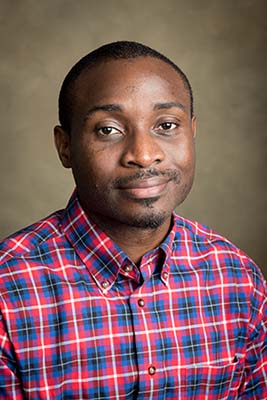
How did you get interested in your research subject?
I have always been interested in the political affordance of African cultural forms. This broad interest crystallized into a research agenda in my undergraduate junior year when a professor introduced us to literary works dealing with environmental issues. It was at the height of agitation and unrest in the nearby oil-rich Niger Delta, where armed youth groups were mobilizing against the exploitation of their environment by oil companies and the government. It was interesting to read literary perspectives on the subject—in the form of novels and poems—and that got me thinking about the aesthetic and political valences of these texts. It was much later in graduate school and as I worked on my first book, Naturalizing Africa, that the amateurish questions of my undergraduate days solidified into intellectual inquiries that continue to fascinate me.
What are your intellectual passions? What are you passionate to teach?
From my response to the earlier question, it should be easy to deduce my interest in the worldliness of texts, which means that I am passionate about the ethical and political stakes of the literary enterprise. My research and teaching navigate a twinned commitment to investigating the formal properties of texts and what they tell us about the larger world.
I love introducing students to the multidimensions of Africa and encouraging them to grapple with the complexities of African narratives as portals into that variegated world. Estrangement and defamiliarization are central to my teaching; it is always a pleasure to teach works like Chinua Achebe’s Arrow of God, where the Igbo setting occupies a geographical and temporal distance from what normalcy is for most of my students. Guiding students to stay with the unfamiliar word, phrase, sentence, paragraph, or cultural practice and to grapple with the ethical quandaries of the postcolonial condition are intertwined intellectual and pedagogic passions for me.
What is the value of studying literature in the current political climate?
As an immigrant and person of color, it is clear to me that the current political climate is characterized by fear, fear of the unassimilable and the unknown. Literature’s role as portal of difference and singularity is useful in our current moment because of its ability to inscribe difference but also deliver the Other to us, as David Palumbo-Liu describes it. When we combine its estranging character and bridgebuilding capacity with literature’s empathetic affect, it is possible to appreciate its priceless relevance for our age. Literature can help us with the distribution of solitude and solace necessary for coping with the exigencies of today’s world, even as its imaginary possibilities allow the cultivation of hope amidst the allure of despair.
What are you reading for fun right now?
I most recently read Trevor Noah’s memoir, Born a Crime, a fascinating account of growing up in apartheid South Africa. I especially liked the interweaving of the pain and pleasures of this era in creating a balance between hilarity and the seriousness that the weighty subject of Apartheid deserves. On my to-read-soon list are Emmanuel Iduma’s A Stranger’s Pose and Helon Habila’s Travelers.
What was your favorite job before becoming an academic?
I decided to pursue an academic career in my undergraduate years with the encouragement of my professors and went straight to graduate school. This means that I have not held any job besides being a graduate student and a professor. Growing up, though, I would help my parents in their small business in Lagos, Nigeria. While I admired their hard work and tenacity, that world did not appeal to me. The world of books was more attractive.